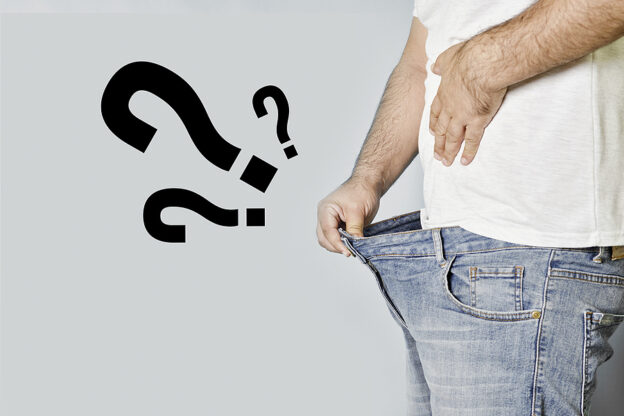By David Blyweiss, M.D., Advanced Natural Wellness
February 16, 2022
Your penis may look smaller as you grow older. But is it actually shrinking?
It’s not as though we men don’t have enough to worry about in that department. As we age, our man-parts don’t always perform exactly like we want them to. Add onto that the idea of a shrinking penis and it really ups the pressure.
Well, let me reassure you. The size of your adult penis was determined long before you were born. It’s like a genetic lottery – and you get whatever penis you’re dealt. Unless some type of surgery is involved, you’re never going to make it larger, and it’s not going to get any smaller.
Still, it can appear to be shrinking – even though it’s not.
One of the top reasons for an “incredible shrinking penis” is excess weight.
MD Exposes the Hidden Danger to Your Eyes

When your eyesight starts to fail, it's a real problem. Suddenly you can't go to the grocery store... you can't get to the doctor if you have an emergency... you can't meet your friends for dinner…
Your "regular" doctor doesn't have time to keep up with the latest research. And the same goes for eye doctors. They go to school to learn how to fit you for glasses and contacts, but have no way of preventing the damage and loss of eyesight that threatens your freedom and independence.
Let me show you something that explains a LOT about how your eyes work.
In my FREE Special Report, I'll show you a HUGE, untapped resource for your eyes that safely and naturally restores clear, effortless eyesight.
Click here to get started...
When you gain weight, it starts to envelope the base of the penis. So the first inch or two of your shaft actually gets buried in the pubic fat. But rest assured, it hasn’t shrunk. It’s just not visible
This isn’t really something that’s been well researched. But there was a small study in The Journal of Sexual Medicine that confirmed it. They measured penis sizes of men in different BMI categories. When measured from pubic fat to the penis tip, the men with higher BMIs had shorter penis length. But when measured from the actual pubic bone to the tip, there was no loss of length.
So although your penis may appear smaller due to weight gain, it’s really nothing more than an optical illusion. When you lose those excess pounds, it will be the same as it always was.
Why ED Makes the Penis Look Smaller
For the most part, erectile dysfunction (ED) is a vascular problem. It’s caused by poor circulation, like blocked blood vessels and high blood pressure.
But here’s the thing. An erection starts with increased blood flow to your penis. When the vessels that carry blood to your member are constricted, it makes your erections smaller and less firm than they used to be.
So the penis is still the same size, it’s just not filling up with the same amount of blood as it used to.
You could compare it to a balloon. An empty balloon is flaccid. But when you blow air into it, it appears to grow larger. If you only put a small amount of air into it, it turns out to be a small balloon. But if you put more air into it, it becomes a large balloon.
Are You Suffering From...
- Love handles and a pot belly
- Romance that isn't what it used to
- Forgetfulness and inattention
- Low (or no) strength and endurance
- A sex drive that's shifted into neutral...or worse
If so...you may have Mature Male Burnout. Click here to discover more about this unique condition and what you can do about it.
It’s the same concept. The size of the actual balloon (or penis) hasn’t changed. It just doesn’t get filled all of the way up, so it seems smaller.
So the real problem is that you can’t get enough blood to your penis. And that’s an extremely important issue. Because if your blood can’t get to your groin, then chances are good it can’t get to other places in your body where it’s needed. Like your heart, brain, lungs and other organs.
But there is a very simple way to get your blood flowing steadily again.
Boost Your Blood Supply to Revive Your Penis
One of the most important substances for steady blood flow is nitric oxide, or NO, which is produced by your own body. It expands and relaxes your blood vessels, which increases circulation so oxygen and nutrients can be delivered where they are needed.
While NO is most widely recognized for its ability to help regulate blood pressure, it’s also involved in producing and maintaining firm erections.
Unfortunately, the levels of nitric oxide your body produces decrease with age. So blood vessels get narrower and blood flow gets sluggish. This, of course, reduces blood flow to all of your organs, including your penis.
You can get NO from certain leafy green vegetables, like arugula, spinach and kale. But unfortunately, you can’t really get a sustained NO boost with these foods.
Beetroot juice, on the other hand, is by far your top choice to elevate nitric oxide levels and increase the flow of life-giving blood through your arteries and into your penis. So I recommend a high-quality beetroot juice supplement.
I also recommend getting more garlic in your diet. It helps reduce plaque in your arteries and improve circulation. Just two cloves a day will do the job. (Or if you want to keep your breath sweet smelling, try a supplement of 1200 mg. aged garlic extract each day in divided doses of 600 mg. twice a day.)
While upping your NO levels is extremely important for good blood flow and erectile function, it’s not the only thing you should focus on. In next few days, I’ll delve a little deeper into the underlying problem.
SOURCES:
Caskurlu T, Tasci AI, Resim S, Sahinkanat T, Ergenekon E. The etiology of erectile dysfunction and contributing factors in different age groups in Turkey. Int J Urol. 2004 Jul;11(7):525-9.
Toprakçi M, Ozmen D, Mutaf I, Turgan N, Parildar Z, Habif S, Güner I, Bayindir O. Age-associated changes in nitric oxide metabolites nitrite and nitrate. Int J Clin Lab Res. 2000;30(2):83-5.
Hurt KJ, Sezen SF, Lagoda GF, Musicki B, Rameau GA, Snyder SH, Burnett AL. Cyclic AMP-dependent phosphorylation of neuronal nitric oxide synthase mediates penile erection. Proc Natl Acad Sci U S A. 2012 Oct 9;109(41):16624-9.
Ried K. Garlic lowers blood pressure in hypertensive subjects, improves arterial stiffness and gut microbiota: A review and meta-analysis. Exp Ther Med. February 2020;19(2):1472-1478.







